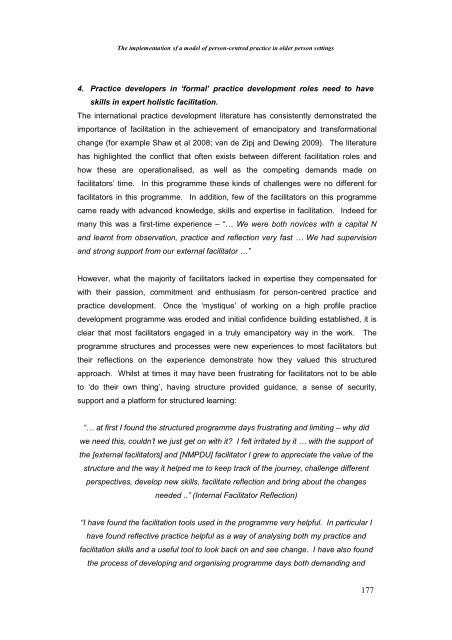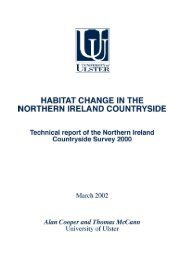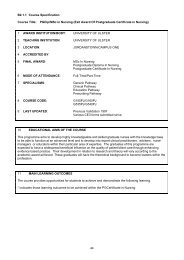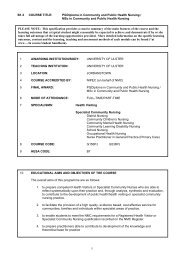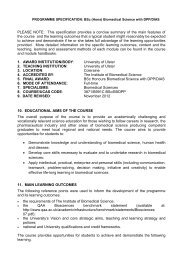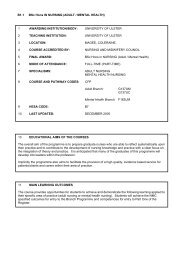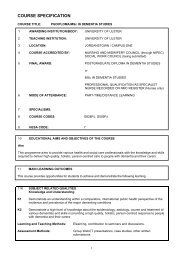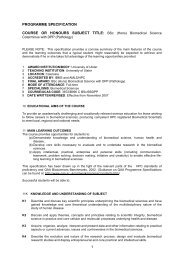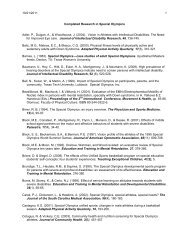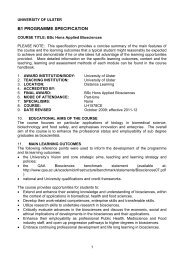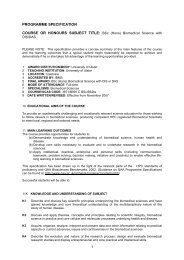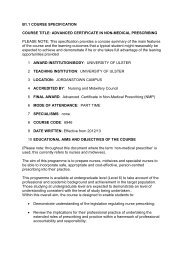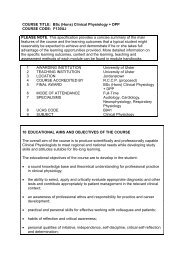The Implementation of a Model of Person-Centred Practice In Older ...
The Implementation of a Model of Person-Centred Practice In Older ...
The Implementation of a Model of Person-Centred Practice In Older ...
Create successful ePaper yourself
Turn your PDF publications into a flip-book with our unique Google optimized e-Paper software.
<strong>The</strong> implementation <strong>of</strong> a model <strong>of</strong> person-centred practice in older person settings<br />
4. <strong>Practice</strong> developers in ‘formal’ practice development roles need to have<br />
skills in expert holistic facilitation.<br />
<strong>The</strong> international practice development literature has consistently demonstrated the<br />
importance <strong>of</strong> facilitation in the achievement <strong>of</strong> emancipatory and transformational<br />
change (for example Shaw et al 2008; van de Zipj and Dewing 2009). <strong>The</strong> literature<br />
has highlighted the conflict that <strong>of</strong>ten exists between different facilitation roles and<br />
how these are operationalised, as well as the competing demands made on<br />
facilitators’ time. <strong>In</strong> this programme these kinds <strong>of</strong> challenges were no different for<br />
facilitators in this programme. <strong>In</strong> addition, few <strong>of</strong> the facilitators on this programme<br />
came ready with advanced knowledge, skills and expertise in facilitation. <strong>In</strong>deed for<br />
many this was a first-time experience – “… We were both novices with a capital N<br />
and learnt from observation, practice and reflection very fast … We had supervision<br />
and strong support from our external facilitator …”<br />
However, what the majority <strong>of</strong> facilitators lacked in expertise they compensated for<br />
with their passion, commitment and enthusiasm for person-centred practice and<br />
practice development. Once the ‘mystique’ <strong>of</strong> working on a high pr<strong>of</strong>ile practice<br />
development programme was eroded and initial confidence building established, it is<br />
clear that most facilitators engaged in a truly emancipatory way in the work. <strong>The</strong><br />
programme structures and processes were new experiences to most facilitators but<br />
their reflections on the experience demonstrate how they valued this structured<br />
approach. Whilst at times it may have been frustrating for facilitators not to be able<br />
to ‘do their own thing’, having structure provided guidance, a sense <strong>of</strong> security,<br />
support and a platform for structured learning:<br />
“… at first I found the structured programme days frustrating and limiting – why did<br />
we need this, couldn’t we just get on with it? I felt irritated by it … with the support <strong>of</strong><br />
the [external facilitators] and [NMPDU] facilitator I grew to appreciate the value <strong>of</strong> the<br />
structure and the way it helped me to keep track <strong>of</strong> the journey, challenge different<br />
perspectives, develop new skills, facilitate reflection and bring about the changes<br />
needed ..” (<strong>In</strong>ternal Facilitator Reflection)<br />
“I have found the facilitation tools used in the programme very helpful. <strong>In</strong> particular I<br />
have found reflective practice helpful as a way <strong>of</strong> analysing both my practice and<br />
facilitation skills and a useful tool to look back on and see change. I have also found<br />
the process <strong>of</strong> developing and organising programme days both demanding and<br />
177


